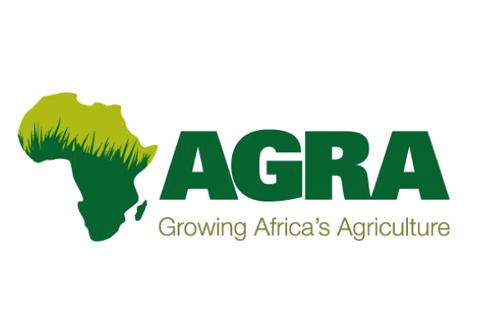Background
The Alliance for a Green Revolution in Africa (AGRA) describes itself as an “alliance led by Africans with roots in farming communities across the continent.”1 “Our Story”, AGRA. Archived November 9, 2020, Archive.vn URL: https://archive.vn/C10D2
It says on its website that “we understand that African farmers need uniquely African solutions designed to meet their specific environmental and agricultural needs so they can sustainably boost production and gain access to rapidly growing agriculture markets.”
AGRA says its approach to policy and advocacy “is aimed at strengthening effective and functional seed, fertilizer and market systems as well other systems enablers.”2 “Policy and Advocacy”, AGRA. Archived November 9, 2020. Archive.vn URL: https://archive.vn/vy8is
It was established in 2006 by the Rockefeller Foundation and the Bill & Melinda Gates Foundation which jointly invested an initial $150 million in AGRA.3 Eric Holt-Giménez, Ph.D., Miguel A. Altieri, Ph.D., and Peter Rosset, Ph.D. “Ten Reasons Why the Rockefeller and the Bill and Melinda Gates Foundations’ Alliance for Another Green Revolution Will Not Solve the Problems of Poverty and Hunger in Sub- Saharan Africa”, Food First, October 2006. Archived November 9, 2020. Archive.vn URL: https://archive.vn/KUkov
Environmental NGO Friends of the Earth International has been critical of the organisation, saying that “AGRA is not in the best interest of Africans, it is a trojan horse for agribusiness.”4 “Gates foundation-led green revolution promotes false solutions to hunger in Africa”, Friends of the Earth International, September 25, 2012. Archived November 9, 2020. Archive.vn URL: https://archive.vn/jj9Lo
Timothy A. Wise, an agricultural development specialist and a senior researcher at the Small Planet Institute, has criticised AGRA’s ties to big corporations, writing in a 2019 opinion piece in Wired that “agribusiness, under the banner of the Alliance for a Green Revolution in Africa, lobbies governments to subsidize expanding fossil-fuel-based fertilizers and commercial seeds.”5 Timothy A. Wise. “Big Ag Is Sabotaging Progress on Climate Change”, Wired, August 28, 2019. Archived November 9, 2020. Archive.vn URL: https://archive.vn/y6cbw
“In Malawi, for example, 40 to 60 percent of the government’s agricultural budget funds these subsidies for farmers to purchase commercial products they otherwise couldn’t afford. They don’t end up getting enough of a yield increase to pay for the inputs, and their land becomes more acidic, less fertile, with the repeated corn crops fed by these fertilizers.” he says. “At best, this wastes scarce government resources. At worst, this perpetuates the kind of unsustainable, fossil-fuel-intensive agriculture the IPCC [U.N. Intergovernmental Panel on Climate Change] is warning us about.”
A 2020 report by policy group Rosa-Luxemburg-Stiftung, which draws on Wise’s research, revealed the “false promises” that came with AGRA and wrote that the Alliance promotes a “one-dimensional, input-intensive and resource-intensive agricultural system”. The report also looked at ways in which technology has been a driving force in AGRA’s Green Revolution model; “its high use of energy-intensive resources is not sustainable: not only in terms of the dramatic effects on biodiversity and soil fertility, but also the high emissions of greenhouse gases and the use of synthetic fertilizers.”6 Abdallah Mkindi et al. “False Promises: The Alliance for a Green Revolution in Africa”, Rosa-Luxemburg-Stiftung, June 2020. Archived November 9, 2020. Archive.vn URL: https://archive.vn/6wNRE
In 2006, the Institute for Food and Development Policy released a report that was highly critical of AGRA’s approach. It listed 10 reasons why the project will not solve problems of poverty and hunger in Sub-Saharan Africa. Among its criticisms, it said AGRA’s favoured technologies “degrade tropical agro-ecosystems and expose already vulnerable farmers to increased environmental risk”, that AGRA “ignores the many successful agroecological and non-corporate approaches to agricultural development”, and that “without addressing structural inequities in the market and political systems, approaches relying on high input technological solutions fail”.7 Eric Holt-Giménez, Ph.D., Miguel A. Altieri, Ph.D., and Peter Rosset, Ph.D. “Ten Reasons Why the Rockefeller and the Bill and Melinda Gates Foundations’ Alliance for Another Green Revolution Will Not Solve the Problems of Poverty and Hunger in Sub- Saharan Africa”, Food First, October 2006. Archived November 9, 2020. Archive.vn URL: https://archive.vn/KUkov
AGRA regularly promoted the work of the agricultural and chemical giant formerly known as Monsanto (now Bayer).
Peter Rosset, a Chiapas, Mexico-based agricultural expert with Via Campesina, the international food-sovereignty movement, told the New York Times magazine in 2008: “Monsanto already controls much of the world’s seed market, and AGRA and by extension Gates, is courting the major firms like Monsanto and Syngenta.”8 David Rieff. “A Green Revolution for Africa?” The New York Times, October 10, 2008. Archived November 9, 2020. Archive.vn URL: https://archive.vn/RU0wI
Stance on Climate Change
In a statement at the UN Climate Action Summit, AGRA President Dr. Agnes Kalibata said that there needs to be an increased focus on helping farmers to adapt to climate change. Kalibata said: “The tragedy is that most climate investments are almost entirely focused on reducing emissions, not on helping people like African farmers adapt.”9 “Statement by AGRA President at the UN Climate Action Summit”, AGRA, October 8, 2019. Archived November 9, 2020. Archive.vn URL: https://archive.vn/i6nyt
“While reductions in emissions are welcome, the effects of global heating are already underway and will continue for decades. Adaptation is critical. Without it, these farmers could be part of the 100 million people that a new assessment from the Global Commission on Adaptation warns could be pushed below the poverty line by 2030.”
Kalibata said that farmers are adapting to climate change by “diversifying their crops to include drought-tolerant varieties of cassava, sweet potato, pigeon pea, beans and maize.” She also said that there is a need to scale up existing technologies that farmers can use to increase productivity, including “seed varieties that are adapted to local conditions; fertilizers that are specific to soil needs; and irrigation technologies that are suited to the needs of the farmers.”
Messaging on Precision Agriculture
One of the areas of focus for AGRA’s work is listed on its website as “Resilience and Climate Adaptation”. It says that while climate change presents challenges to agriculture, particularly that of smallholders, it also presents “a window of opportunity to transform agriculture systems to generate multiple benefits to both people and planet.”10 “Resilience and Climate Adaptation”, AGRA. Archived November 9, 2020. Archive.vn URL: https://archive.vn/qvIXR
In November 2017, the Alliance published an article by Robert Fraly, the former Executive Vice President and chief technology officer at Monsanto. The piece was aimed at encouraging students and young people to understand that “a career in agriculture can be just as ‘cool’ as designing the next smartphone or video game app” – making references to the use of digital technology on today’s farms.11 Dr. Robert T. Fraley. “Growing the Next Generation of Agricultural Leaders”, AGRA, November 9, 2017. Archived November 9, 2020. Archive.vn URL: https://archive.vn/mtyII
In 2019, AGRA partnered with Microsoft to develop the tech company FarmBeats, an AI system for farmers to get data and use precision agriculture techniques. According to Food Business Africa, the project would be implemented in Ghana, Nigeria, Mali, Burkina Faso, Ethiopia, Kenya, Uganda, Rwanda, Tanzania, Malawi, and Mozambique, and would “ensure the farmers adopt the new technologies,” including making use of sensors, camera’s, and drones, through an internship programme.12 “Microsoft Partners with AGRA to boost agriculture through technology”, Food Business Africa, Archived November 9, 2020. Archive.vn URL: https://archive.vn/QIJ2P
In July 2020, Timothy Wise wrote that the AGRA’s approach to a “Green Revolution” was “failing” and that technologies brought by AGRA were “inappropriate” for Africa’s soils, farmers and food systems. Wise also criticised the technology as “promoting the adoption of so-called high-yield seed varieties fed with inorganic fertilizer,” going on to say that the Alliance had not “published an evaluation of the impacts.”13 Timothy A. Wise. “Africa’s Green Revolution has Failed, Time to Change Course”, Institute for Agriculture and Trade Policy, July 2020. Archived November 9, 2020. Archive.vn URL: https://archive.vn/C8nqI
Read more: Digital and Precision Agriculture – Criticisms and Concerns
Messaging on Regenerative Agriculture
AGRA was mentioned by Regeneration International in a 2019 article which described the Alliance as the “poster child” for the “promotion of input-intensive agriculture in Africa”.14 Timothy A. Wise. “Agroecology as Innovation”, Regeneration International, November 7, 2011. Archived November 9, 2020. Archive.vn URL: https://archive.vn/f1zUJ
In January 2020, AGRA President Dr. Agnes Kalibata wrote how regenerative agricultural systems “reduce requirements, boost transparency, and improve the incomes and livelihoods of smallholder farms”.15 “A New Nature-Based Food and Land Use Economy”, AGRA, November 9, 2020. Archived November 9, 2020. Archive.vn URL: https://archive.vn/IjU05
Read more: Regenerative Agriculture – Criticisms and Concerns
Lobbying
A 2020 report by Rosa-Luxemberg-Stiftung dedicated a section to how AGRA was “influencing policies”, noting that reforming seed policies “has always been high on AGRA’s agenda”.16 Abdallah Mkindi et al. “False Promises: The Alliance for a Green Revolution in Africa”, Rosa-Luxemburg-Stiftung, June 2020. Archived November 9, 2020. Archive.vn URL: https://archive.vn/6wNRE
In its executive summary, the report wrote that the Alliance “lobbies African governments for the development of policies and market structures” which “open the doors to Green Revolution inputs, including seeds and pesticides, and prevents alternative approaches such as agroecology from receiving support.”17 Abdallah Mkindi et al. “False Promises: The Alliance for a Green Revolution in Africa”, Rosa-Luxemburg-Stiftung, June 2020. Archived November 9, 2020. Archive.vn URL: https://archive.vn/6wNRE
Funding
AGRA lists 24 funding partners on its website who it says “provide direct financial support to AGRA and its programs.” They are:18 “Our Partners”, AGRA. Archived November 9, 2020. Archive.vn URL: https://archive.vn/LRlr3
- Africa Enterprise Challenge Fund (AECF)
- African Fertilizer and Agribusiness Partnership
- African Development Bank
- African Union
- Bill and Melinda Gates Foundation
- Federal Ministry of Economic Cooperation and Development (BMZ)
- Canada Department Foreign Affairs and Trade Development
- International Maize and Wheat Improvement Centre (CIMMYT)
- Technical Centre for Agricultural and Rural Cooperation (CTA)
- Farm to Market Alliance
- Food and Agricultural Organisation of the United Nations (FAO)
- International Development Research Centre (IDRC)
- International Fund for Agricultural Development (IFAD)
- Kingdom of the Netherlands
- Mastercard Foundation
- NEPAD
- Norad
- The Rockefeller Foundation
- Swedish International Development Cooperation Agency (Sida)
- United National Environment Programme (UNEP)
- USAID
- UK Aid Direct
- United Nations World Food Programme (WFP)
- Yara
Affiliations
In May 2011, AGRA was part of a symposium convened by the International Tropical Agricultural Programme, aimed at upgrading Africa’s agricultural value chains. Monsanto, DuPont and the Syngenta Foundation were also involved.19 “Upgrading Agricultural Value Chains for the African Green Revolution 2.0”, Agriculture and Food Security Centre, Columbia University, May 2011. Archived November 9, 2020. Archive.vn URL: https://archive.vn/mNHIj
In June 2019, AGRA, Syngenta and the Syngenta Foundation for Sustainable Agriculture signed an agreement to work together towards developing Africa’s agricultural system, specifically by helping to increase access to yield-enhancing technologies and pest control products.20 “AGRA and Syngenta Partner for Africa”, Syngenta, June 18, 2020. Archived November 9, 2020. Archive.vn URL: https://archive.vn/0qP8F
In July 2019, AGRA signed a partnership with Corteva to develop and maximize food productivity in Ethiopia. During the launch, Vanessa Adams, Vice-President for country support and delivery at AGRA, said “this collaboration will, among other things, boost our work to transform the lives of smallholder farmers by improving their access to yield enhancing technologies including but not limited to hybrid seeds, good agriculture practices, and post-harvest management.”21 “Corteva Agriscience Partners with AGRA to boost Ethiopia farmers’ productivity”, AGRA, July 10, 2019. Archived November 9, 2020. Archive.vn URL: https://archive.vn/VuuGs
Other Resources
Resources
- 1
- 2
- 3Eric Holt-Giménez, Ph.D., Miguel A. Altieri, Ph.D., and Peter Rosset, Ph.D. “Ten Reasons Why the Rockefeller and the Bill and Melinda Gates Foundations’ Alliance for Another Green Revolution Will Not Solve the Problems of Poverty and Hunger in Sub- Saharan Africa”, Food First, October 2006. Archived November 9, 2020. Archive.vn URL: https://archive.vn/KUkov
- 4“Gates foundation-led green revolution promotes false solutions to hunger in Africa”, Friends of the Earth International, September 25, 2012. Archived November 9, 2020. Archive.vn URL: https://archive.vn/jj9Lo
- 5Timothy A. Wise. “Big Ag Is Sabotaging Progress on Climate Change”, Wired, August 28, 2019. Archived November 9, 2020. Archive.vn URL: https://archive.vn/y6cbw
- 6Abdallah Mkindi et al. “False Promises: The Alliance for a Green Revolution in Africa”, Rosa-Luxemburg-Stiftung, June 2020. Archived November 9, 2020. Archive.vn URL: https://archive.vn/6wNRE
- 7Eric Holt-Giménez, Ph.D., Miguel A. Altieri, Ph.D., and Peter Rosset, Ph.D. “Ten Reasons Why the Rockefeller and the Bill and Melinda Gates Foundations’ Alliance for Another Green Revolution Will Not Solve the Problems of Poverty and Hunger in Sub- Saharan Africa”, Food First, October 2006. Archived November 9, 2020. Archive.vn URL: https://archive.vn/KUkov
- 8David Rieff. “A Green Revolution for Africa?” The New York Times, October 10, 2008. Archived November 9, 2020. Archive.vn URL: https://archive.vn/RU0wI
- 9“Statement by AGRA President at the UN Climate Action Summit”, AGRA, October 8, 2019. Archived November 9, 2020. Archive.vn URL: https://archive.vn/i6nyt
- 10“Resilience and Climate Adaptation”, AGRA. Archived November 9, 2020. Archive.vn URL: https://archive.vn/qvIXR
- 11Dr. Robert T. Fraley. “Growing the Next Generation of Agricultural Leaders”, AGRA, November 9, 2017. Archived November 9, 2020. Archive.vn URL: https://archive.vn/mtyII
- 12“Microsoft Partners with AGRA to boost agriculture through technology”, Food Business Africa, Archived November 9, 2020. Archive.vn URL: https://archive.vn/QIJ2P
- 13Timothy A. Wise. “Africa’s Green Revolution has Failed, Time to Change Course”, Institute for Agriculture and Trade Policy, July 2020. Archived November 9, 2020. Archive.vn URL: https://archive.vn/C8nqI
- 14Timothy A. Wise. “Agroecology as Innovation”, Regeneration International, November 7, 2011. Archived November 9, 2020. Archive.vn URL: https://archive.vn/f1zUJ
- 15“A New Nature-Based Food and Land Use Economy”, AGRA, November 9, 2020. Archived November 9, 2020. Archive.vn URL: https://archive.vn/IjU05
- 16Abdallah Mkindi et al. “False Promises: The Alliance for a Green Revolution in Africa”, Rosa-Luxemburg-Stiftung, June 2020. Archived November 9, 2020. Archive.vn URL: https://archive.vn/6wNRE
- 17Abdallah Mkindi et al. “False Promises: The Alliance for a Green Revolution in Africa”, Rosa-Luxemburg-Stiftung, June 2020. Archived November 9, 2020. Archive.vn URL: https://archive.vn/6wNRE
- 18
- 19“Upgrading Agricultural Value Chains for the African Green Revolution 2.0”, Agriculture and Food Security Centre, Columbia University, May 2011. Archived November 9, 2020. Archive.vn URL: https://archive.vn/mNHIj
- 20“AGRA and Syngenta Partner for Africa”, Syngenta, June 18, 2020. Archived November 9, 2020. Archive.vn URL: https://archive.vn/0qP8F
- 21“Corteva Agriscience Partners with AGRA to boost Ethiopia farmers’ productivity”, AGRA, July 10, 2019. Archived November 9, 2020. Archive.vn URL: https://archive.vn/VuuGs






